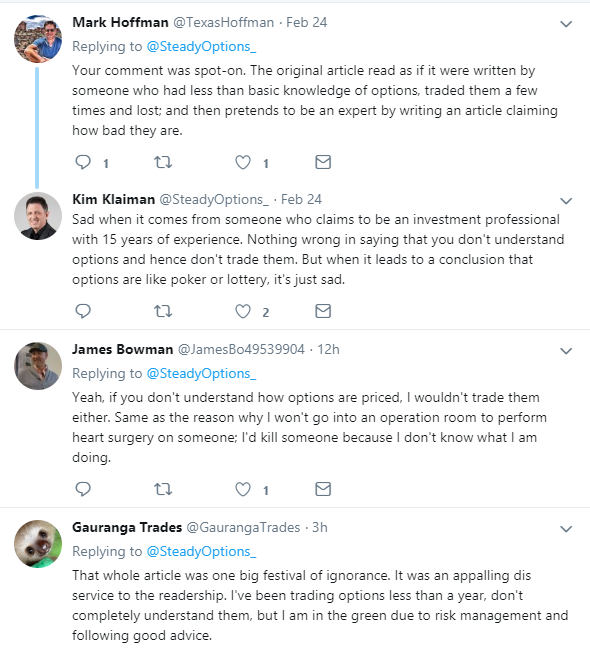
Mr. Marstrand who claims to be a financial professional with 15 years of experience in the investment bank industry, starts with the following paragraph:
Quote"Free money with a few clicks using this Wall Street secret!" Who wouldn't want that? It's the sort of thing often claimed by options trading services. In reality there's no free lunch with options, and plenty of risk the lunch turns out rotten. So let me explain why I never trade stock options.
There are many dishonest trading services. Those claims are not unique to services who trade options. I do agree that there is no free lunch with options, but this is true for any style of investing or trading.
Mr. Marstrand continues with example of his friend "Bill" who worked for Swiss Bank Corporation. Bill had lost about $50 million of SBC's money the previous week trading stock options. Mr. Marstrand's conclusion?
QuoteHe lost all that money despite him being a highly trained, full time, professional trader in the market leading bank in his business. I just want you to know that even the pros get burnt by stock options.
So? Warren Buffett has lost $4.3 billion in single day on Kraft Heinz plunge. What's the conclusion? Yes, even the pros lose money in the stock market. It's part of the game. But it has nothing to do with options. You can lose money trading stocks, ETFs, futures, commodities, options etc. Investing in a simple S&P 500 index fund would cause a 51% drawdown during the 2008 crisis. Does it mean you should stop investing in the stock market?
Here is Mr. Marstrand's next "gem":
QuoteAll option strategies - even the supposedly low risk ones - have substantial risks which aren't always obvious. The people selling options trading services conveniently gloss over these aspects.
Well.. NO! This statement is simply false. Some option strategies are risky, but many of them are much safer than stocks. A strategy like collar limits your downside risk, and can be considered much safer than just holding the stock. Naked puts have higher margin of safety than stocks.
Of course if you treat options as lottery tickets, you have only yourself to blame.
And yes, SOME people who sell options trading services don't disclose the risks. But then again, if some people are dishonest, does it discredit the whole industry and the options trading in general?
Going to the next statement:
QuoteOh, and it's a lot of work. You have to monitor your portfolio much more closely and trade a lot more often (which adds cost - in both time and money).
It could a lot of work, depending on the strategy. Some strategies require less monitoring. And yes, it's not for everyone. But that work can produce handsome returns if done properly, so many traders find it well worth it.
QuoteBut, in the end, most private investors that trade stock options will turn out to be losers.
Correct. Same is true for stock investors. Most investors lose money in the stock market. It has nothing to do with the vehicle they select. It is mostly related to human psychology and human emotions.
Next gem:
QuoteConsider this. If you buy or sell options through your broker, who do you think the counterparty is? Who is taking the other side of the trade? Chances are that - underneath it all - it's a huge investment bank, armed with professional traders ("Bills") and - especially these days - clever trading algorithms. And intermediaries like your broker will take their cut as well. Who do you think is getting the "right" price? Or better than right? It surely isn't you.
This statement is wrong on so many levels I don't even know where to start.
First, professional traders or algos don't always get it right. They are wrong many many times. In fact, most funds cannot even beat the market. But the same argument can be made about stock trading as well. If you buy a stock, you bet it will go up. The professional trader of the other side of the trade bets it will go down. According to Mr. Marstrand's logic, you have no chance against those guys.
Second, with options trading, it is likely that on the other side of the trade is a market maker and not some institutional trader. Market makers are obligated to provide liquidity in the options market, and there is a good chance that they will be on the other side of the trade.
Third (and probably the most important), any options trade can be part of a more complex strategy. If you buy a call, does it necessarily mean you bet on the stock to go up? It could be part of a neutral strategy like a straddle. And the guy who is selling you the call (if it's not a market maker), could be doing it as part of a covered call strategy. At the end, you both could be making money. This is why options are NOT Zero Sum Game.
Now to the final "gem":
QuoteAs Warren Buffett once said: "If you've been playing poker for half an hour and you still don't know who the patsy is, you're the patsy."
Are you seriously comparing options trading to poker Mr.Marstrand?
Options are such a wonderful tool if used properly. It offers great flexibility not only to speculate, but also to hedge, and much more.
As an example, over the past 25 years, the CBOE S&P 500 PutWrite Index (PUT) has outperformed the S&P 500 index, with lower volatility and better risk-adjusted returns. A simple strategy of writing fully collateralized naked puts on indexes, improved the sharpe ratio by over 30%.
Of course if all you do is buying some cheap OTM options as lottery tickets, you have only yourself to blame.
Twitter comments confirm that our followers know better:

One thing I do agree with Mr.Marstrand: if you want to trade options, be prepared to for a steep learning curve. As we tell our members, "learn first, trade later".
Conclusion
The only dangerous part of options trading is the risk-insensitive trader who buys and sells options with little or no understanding of just what can go wrong. The options, by themselves, are not dangerous tools.
It is possible to use options to speculate (gamble), but options were created as hedging, or risk-reducing, investment tools.
An alarming number of financial professionals, including stockbrokers, financial planners and journalists are in position to educate the public about the many advantages to be gained from option strategies, but fail to do so. Many public investors never bother to make the effort to learn about options once they hear negative statements from professional advisors.
Related articles


There are no comments to display.
Join the conversation
You can post now and register later. If you have an account, sign in now to post with your account.
Note: Your post will require moderator approval before it will be visible.